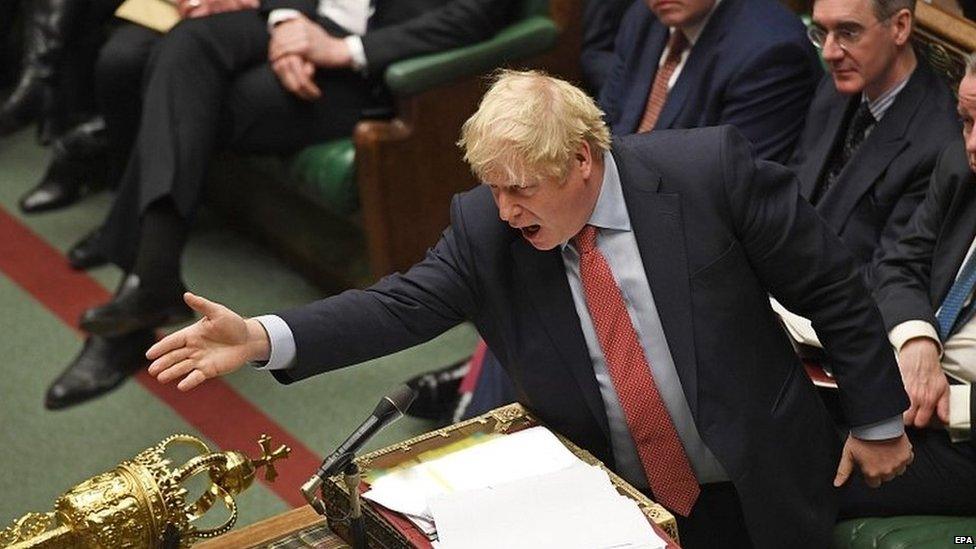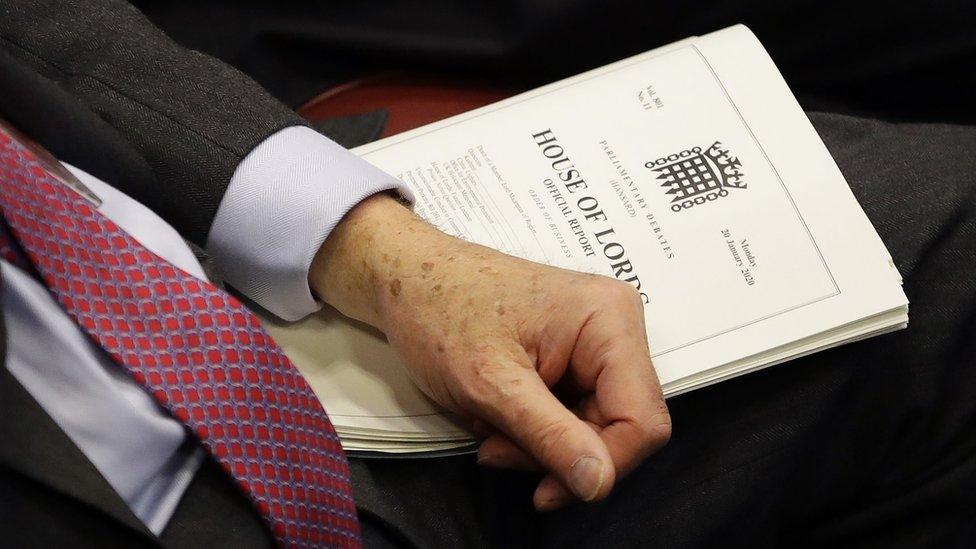Brexit: UK has 'crossed Brexit finish line', says Boris Johnson
- Published
- comments

Boris Johnson has said the UK has "crossed the Brexit finish line" after Parliament passed legislation implementing the withdrawal deal.
The EU Bill, which paves the way for the country to leave the bloc on 31 January, is now awaiting royal assent.
The PM said the UK could now "move forwards as one" and put "years of rancour and division behind it".
The EU's top officials are expected to sign the agreement in the coming days, while MEPs will vote on it next week.
The European Parliament will meet on 29 January to debate the agreement, which sets out the terms of the UK's "divorce" settlement with the EU, the rights of EU nationals resident in the UK and British expats on the continent and arrangements for Northern Ireland.
Its ratification is expected to prove a formality.
The UK will officially leave the bloc at 23:00 GMT on 31 January - more than three and a half years after the country voted for Brexit in a referendum in June 2016.
From 1 February, the UK will enter into an 11-month transition period in which it will continue to follow EU rules but without representation in the bloc's institutions.
This arrangement will come to an end on 1 January 2021, by which point the two sides hope to have completed negotiations on their future economic and security partnership, at the heart of which the government believes will be an ambitious free trade deal.
What happened on Wednesday?
The government's Brexit Bill, which enshrines the agreement reached by Mr Johnson in October, is one step away from becoming law after completing its passage through Parliament without any changes.
MPs overwhelmingly rejected all the changes made to the bill in the House of Lords earlier this week - on citizens' rights, the power of UK courts to diverge from EU law, the independence of the judiciary after Brexit and the consent of the UK's devolved administrations.

MPs also removed an amendment which would have obliged the government to negotiate an agreement with the EU to allow unaccompanied children who have claimed asylum elsewhere but have a relative in the UK to be re-united with their family.
The bill, as agreed by Parliament, would only compel the government to make a statement on the issue within two months.
Ministers insisted they backed the principle of the Dubs amendment, tabled by the Labour peer Lord Dubs, but argued that there was no point legislating before the UK reached an agreement with the EU on future numbers.
Lord Dubs, who has been campaigning on the issue for years, said the outcome was "bitterly disappointing" while Green Party MP Caroline Lucas said the government had shown a "compassion by-pass".
What happens next?
The ratification process will be completed over the next week in time for the 31 January deadline.
Belgian politician Charles Michel, who represents the 27 remaining states as president of the European Council, is expected to sign the document in the coming days as will European Commission President Ursula von der Leyen.
Mr Johnson will also sign officially the agreement on behalf of the UK government.
The prime minister, who became Tory leader in July on the back of a promise to "get Brexit done" and won an overwhelming victory at last month's general election, said Parliamentary approval was a major milestone.
"Parliament has passed the Withdrawal Agreement Bill, meaning we will leave the EU on 31 January and move forwards as one United Kingdom.
"At times it felt like we would never cross the Brexit finish line, but we've done it. Now we can put the rancour and division of the past three years behind us and focus on delivering a bright, exciting future."


What questions do you have about Brexit and how it will affect you in the future?
In some cases your question will be published, displaying your name, age and location as you provide it, unless you state otherwise. Your contact details will never be published. Please ensure you have read our terms & conditions and privacy policy.
Use this form to ask your question:
If you are reading this page and can't see the form you will need to visit the mobile version of the BBC website to submit your question or send them via email to YourQuestions@bbc.co.uk, external. Please include your name, age and location with any question you send in.